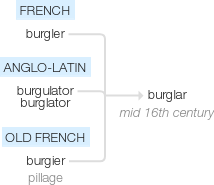Burglar
mid 16th century: from legal French burgler or Anglo-Latin burgulator, burglator ; related to Old French burgier ‘pillage’.
wiktionary
Borrowed from BritishMedieval Latin burglātor, from Old French burgeor(“burglar”), from Medieval Latin burgātor(“burglar”), from burgō(“to commit burglary”), from Late Latin burgus(“fortified town”), probably from Frankish *burg(“fortress”), from Proto-Germanic *burgz, *burgiją(“borough, watch-tower”). The -l- may have been inserted under influence from Latin latro(“thief”).
etymonline
burglar (n.)
"one who commits robbery by breaking into a house," 1540s, shortened from Anglo-Latin burglator (late 13c.), earlier burgator, from Medieval Latin burgator "burglar," from burgare "to break open, commit burglary," from Latin burgus "fortress, castle," a Germanic loan-word akin to borough.
The unetymological -l- is perhaps from influence of Latin latro "thief" (see larceny). Middle English had burgur (c. 1200), from Old French burgeor, burgur, also housbreker (c. 1400). Burglar-alarm is by 1840.
